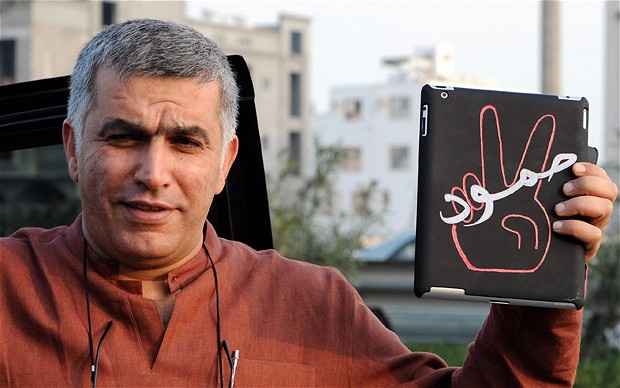30 April 2019 – The Bahrain Institute for Rights and Democracy (BIRD) wrote to President Macron urging him to address human rights concerns during tomorrow’s meeting with the King of Bahrain, including calling for the release of those imprisoned for exercising their right to freedom of expression.
Commenting, the Director of Advocacy at the Bahrain Institute for Rights and Democracy, Sayed Ahmed Alwadaei, said: “During his meeting with Bahrain’s monarch, President Macron should advocate for the release of political prisoners in Bahrain. Among those imprisoned for peacefully criticising the Government of Bahrain is Nabeel Rajab, whose admirable efforts to promote human rights earned him the status of an honorary citizen of Paris. Failure to raise the appalling human rights crackdown should be viewed as stain on France’s historical commitment to human rights and individual freedoms as enshrined in its constitution.”
Please find the full letter below:
President Macron
Palais de l’Élysée
55 Rue du Faubourg,
Saint-Honoré,
75008 Paris,
France
29 April 2019
Dear President Macron,
We write to you in anticipation of your meeting in Paris tomorrow with King Hamad bin Isa AlKhalifa to urge that you press him to show a greater respect for his citizens’ rights to freedom of assembly, association, expression, nationality and life.
France has a long history of protecting free speech and has previously criticised Bahrain for its “treatment of human rights defenders and political opponents.” Today, we call on you to honour this tradition by advocating for those who have been punished for voicing their opinion.
Nabeel Rajab: Honorary Citizen of Paris
In 2018, the Council of Paris made Nabeel Rajab, the imprisoned Director of the Bahrain Centre for Human Rights, an honorary citizen of the French capital for his tireless campaigning for human rights in the Gulf region. Nabeel is serving a five year sentence in Bahrain’s notoroius Jau Prison for opposing the Saudi bombing of Yemen and exposing torture in Bahraini jails on Twitter. In 2018, the UN Working Group on Arbitrary Detention called for Nabeel’s immediate release, declaring his imprisonment to be “arbitrary.”
Deterioration of Civil Society and Human Rights
Nabeel’s case is part of a wider crackdown on political dissent. Since the emergence of pro-democracy protests in 2011, the government of Bahrain has instigated a campaign of repression which has exploited national security concerns as a pretext to stifle dissent and severely curtail human rights in the country. Bahrain, one of the smallest countries on earth, now holds the highest prison rate in the Arab world and its prisons have been condemned by rights groups for denying inmates medical treatment for life-threatening illnesses.
Over the last three years, this crackdown has intensified considerably, with torture remaining a “widespread” practice in the country, according to the UN Committee Against Torture. In 2017, executions resumed in Bahrain after a seven year hiatus. At least 20 people remain on death row for political crimes, including two facing imminent execution.The same year, the government forcibly closed the country’s only independent newspaper and dissolved the country’s main opposition parties.
The government regularly uses spurious accusations of terrorism as a pretext to persecute journalists and human rights defenders, particularly for comments posted on social media. Activist Najah Yusuf, who was tortured and sexually assaulted during interrogation, is serving a three year sentence for protesting against the 2017 Bahrain Grand Prix on Facebook. Earlier this year, the opposition leader Ebrahim Sharif, was sentenced for tweets criticising the deposed Sudanese president Omar Albashir.
Furthermore, the government has increasingly used the revocation of citizenship as a means to suppress dissenting voices, with almost 1000 Bahrainis stripped of their citizenship since 2012. As women are still unable to pass citizenship to their children, denaturalising citizens risks perpetuating statelessness across generations.
Concerningly, repression in Bahrain extends beyond the country’s borders. In 2017, the government imprisoned family members of exiled human rights defender Sayed Ahmed Alwadaei, after he protested at Downing Street against King Hamad’s visit to London. The United Nations have condemned their sentences as “acts of reprisal.”
Our requests
Emboldened by the prevailing political climate, despotic regimes across the Arab Gulf have become increasingly flagrant in their disdain for international human rights norms. We implore you to assert France’s continued commitment to the values of liberty, equality and fraternity enshrined in your constitution by advocating for the:
- Release of Nabeel Rajab, and all other human rights defenders and persons imprisoned for criticising the Government of Bahrain;
- Commutation of the death sentence of all victims of due process violations; and
- Reinstatement of citizenship for all cases where it was arbitrarily revoked, especially for those who were rendered stateless.
Yours sincerely,
Sayed Ahmed Alwadaei
Director of Advocacy
The Bahrain Institute for Rights and Democracy (BIRD)




